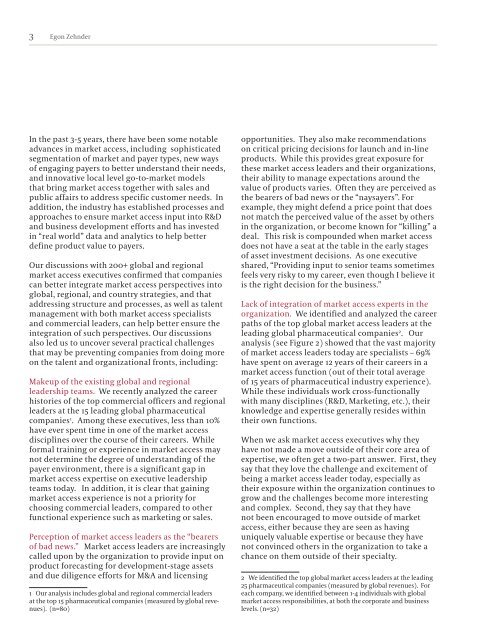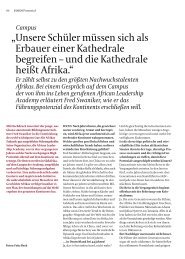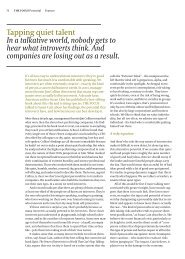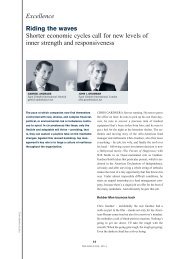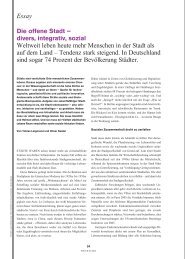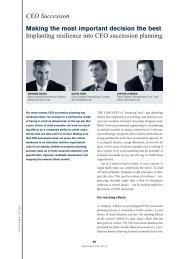managing talent to meet pharma's next great challenge: global ...
managing talent to meet pharma's next great challenge: global ...
managing talent to meet pharma's next great challenge: global ...
You also want an ePaper? Increase the reach of your titles
YUMPU automatically turns print PDFs into web optimized ePapers that Google loves.
3 Egon Zehnder<br />
In the past 3-5 years, there have been some notable<br />
advances in market access, including sophisticated<br />
segmentation of market and payer types, new ways<br />
of engaging payers <strong>to</strong> better understand their needs,<br />
and innovative local level go-<strong>to</strong>-market models<br />
that bring market access <strong>to</strong>gether with sales and<br />
public affairs <strong>to</strong> address specific cus<strong>to</strong>mer needs. In<br />
addition, the industry has established processes and<br />
approaches <strong>to</strong> ensure market access input in<strong>to</strong> R&D<br />
and business development efforts and has invested<br />
in “real world” data and analytics <strong>to</strong> help better<br />
define product value <strong>to</strong> payers.<br />
Our discussions with 200+ <strong>global</strong> and regional<br />
market access executives confirmed that companies<br />
can better integrate market access perspectives in<strong>to</strong><br />
<strong>global</strong>, regional, and country strategies, and that<br />
addressing structure and processes, as well as <strong>talent</strong><br />
management with both market access specialists<br />
and commercial leaders, can help better ensure the<br />
integration of such perspectives. Our discussions<br />
also led us <strong>to</strong> uncover several practical <strong>challenge</strong>s<br />
that may be preventing companies from doing more<br />
on the <strong>talent</strong> and organizational fronts, including:<br />
Makeup of the existing <strong>global</strong> and regional<br />
leadership teams. We recently analyzed the career<br />
his<strong>to</strong>ries of the <strong>to</strong>p commercial officers and regional<br />
leaders at the 15 leading <strong>global</strong> pharmaceutical<br />
companies 1 . Among these executives, less than 10%<br />
have ever spent time in one of the market access<br />
disciplines over the course of their careers. While<br />
formal training or experience in market access may<br />
not determine the degree of understanding of the<br />
payer environment, there is a significant gap in<br />
market access expertise on executive leadership<br />
teams <strong>to</strong>day. In addition, it is clear that gaining<br />
market access experience is not a priority for<br />
choosing commercial leaders, compared <strong>to</strong> other<br />
functional experience such as marketing or sales.<br />
Perception of market access leaders as the “bearers<br />
of bad news.” Market access leaders are increasingly<br />
called upon by the organization <strong>to</strong> provide input on<br />
product forecasting for development-stage assets<br />
and due diligence efforts for M&A and licensing<br />
1 Our analysis includes <strong>global</strong> and regional commercial leaders<br />
at the <strong>to</strong>p 15 pharmaceutical companies (measured by <strong>global</strong> revenues).<br />
(n=80)<br />
opportunities. They also make recommendations<br />
on critical pricing decisions for launch and in-line<br />
products. While this provides <strong>great</strong> exposure for<br />
these market access leaders and their organizations,<br />
their ability <strong>to</strong> manage expectations around the<br />
value of products varies. Often they are perceived as<br />
the bearers of bad news or the “naysayers”. For<br />
example, they might defend a price point that does<br />
not match the perceived value of the asset by others<br />
in the organization, or become known for “killing” a<br />
deal. This risk is compounded when market access<br />
does not have a seat at the table in the early stages<br />
of asset investment decisions. As one executive<br />
shared, “Providing input <strong>to</strong> senior teams sometimes<br />
feels very risky <strong>to</strong> my career, even though I believe it<br />
is the right decision for the business.”<br />
Lack of integration of market access experts in the<br />
organization. We identified and analyzed the career<br />
paths of the <strong>to</strong>p <strong>global</strong> market access leaders at the<br />
leading <strong>global</strong> pharmaceutical companies 2 . Our<br />
analysis (see Figure 2) showed that the vast majority<br />
of market access leaders <strong>to</strong>day are specialists – 69%<br />
have spent on average 12 years of their careers in a<br />
market access function (out of their <strong>to</strong>tal average<br />
of 15 years of pharmaceutical industry experience).<br />
While these individuals work cross-functionally<br />
with many disciplines (R&D, Marketing, etc.), their<br />
knowledge and expertise generally resides within<br />
their own functions.<br />
When we ask market access executives why they<br />
have not made a move outside of their core area of<br />
expertise, we often get a two-part answer. First, they<br />
say that they love the <strong>challenge</strong> and excitement of<br />
being a market access leader <strong>to</strong>day, especially as<br />
their exposure within the organization continues <strong>to</strong><br />
grow and the <strong>challenge</strong>s become more interesting<br />
and complex. Second, they say that they have<br />
not been encouraged <strong>to</strong> move outside of market<br />
access, either because they are seen as having<br />
uniquely valuable expertise or because they have<br />
not convinced others in the organization <strong>to</strong> take a<br />
chance on them outside of their specialty.<br />
2 We identified the <strong>to</strong>p <strong>global</strong> market access leaders at the leading<br />
25 pharmaceutical companies (measured by <strong>global</strong> revenues). For<br />
each company, we identified between 1-4 individuals with <strong>global</strong><br />
market access responsibilities, at both the corporate and business<br />
levels. (n=32)


